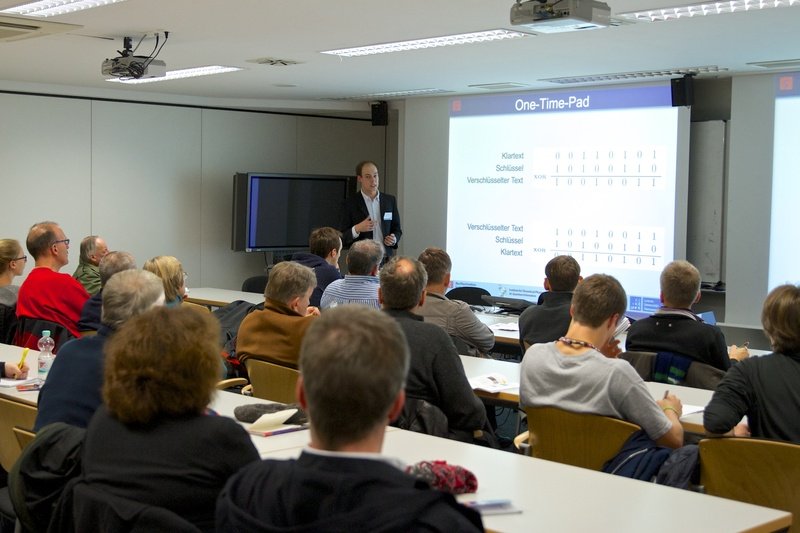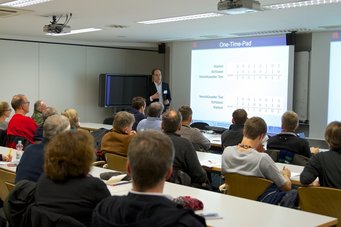Thinking beyond Einstein 2015
Public lectures to celebrate the centennial of the general theory of relativity and the International Year of Light
2015 marks the centennial of Albert Einstein’s general theory of relativity. At the same time, UNESCO has declared 2015 to be the International Year of Light and Light-Based Technologies. That has prompted the Albert Einstein Institute in Hanover to invite the public to a series of lectures in November and December. Scientists will report on the relationship between Einstein’s theory and light technologies, black holes, recent findings on the formation of the universe and the LISA Pathfinder satellite mission. Part of the series is also a Max Planck Forum on the topic of “The Sound of Space-Time”.

Where?
Max Planck Institute for Gravitational Physics (Albert Einstein Institute)
Institute for Gravitational Physics of Leibniz University Hanover
Callinstrasse 38, 30167 Hanover
Room 103 (signposted at the venue)
When?
The public lectures on 11 November, 24 November and 3 December will be held from 6:00 to 7:30 pm. Each lecture lasts around one hour, after which the scientists will field questions. The Max Planck Forum “The Sound of Space-Time” will take place on 18 November from 7:00 to 8:30 pm.
Attendance of the Max Planck Forum requires registration at mpgberlin@gv.mpg.de before 16 November 2015.
Wednesday, 11 November 2015, 6:00 pm
Gravitation and black holes in Albert Einstein’s theory of relativity
On 25 November 1915 – almost exactly a century ago –Albert Einstein presented his general theory of relativity to the Prussian Academy of Sciences. It revolutionized our concept of the universe and the nature of gravity. According to the theory, gravity does not arise directly as a force between masses. Instead, its effects emerge because masses bend and curve the geometry of space-time. In Einstein’s theory, space and time are dynamic: they can deform and even generate waves. What does curved space-time mean in distinction to Isaac Newton’s concept of gravity, and is it perceptible in everyday life? What lies behind the term “black hole”, and are these cosmic objects really as dangerous as science fiction films would have us believe?
Dr. Alex Nielsen of the Max Planck Institute for Gravitational Physics (Albert Einstein Institute) and the Institute for Gravitational Physics of Leibniz University Hanover are combing through data from the LIGO gravitational wave detectors in search of signals from merging black holes and neutron stars. In his lecture, Dr Nielsen will explain Einstein’s theory of gravity and what it tells us about black holes.
Wednesday, 18 November 2015, 7:00 pm
Max Planck Forum “The Sound of Space-Time”
Attendance of the Max Planck Forum requires registration at mpgberlin@gv.mpg.de before 16 November 2015. See the Internet pages of the Max Planck Society.
Man has been gazing into the universe for millennia – first with the naked eye and then later with telescopes and cameras. But some regions of the universe are completely invisible and therefore beyond our reach. Researchers at the Max Planck Institute for Gravitational Physics in Hanover are working on extending our perception of the universe in a completely different way. They want to make the universe audible and are developing innovative technologies at the limit of what is physically possible. If they succeed, it will revolutionize astronomy. What new possibilities and findings can we expect from gravitational wave astronomy? The Max Planck Forum presents background information on our efforts to eavesdrop on the cosmos with laser light and discusses its impact on our view of the universe.
Professor Benno Willke is developing lasers for gravitational wave observatories at the Max Planck Institute for Gravitational Physics (Albert Einstein Institute) and the Institute for Gravitational Physics of Leibniz University Hanover. He discusses and reports together with Dr. Benjamin Knispel of the Max Planck Institute for Gravitational Physics (Albert Einstein Institute) and the Institute for Gravitational Physics of Leibniz University Hanover.
Tuesday, 24 November 2015, 6:00 pm
The beginning of space and time: recent findings from cosmological research
The best “baby photo” of the universe to date was taken in 2013: the universe was just 380,000 years old when it emitted the radiation detected by the Planck satellite. The light therefore took around 13.8 billion years to reach us! But did the universe really start with the Big Bang? The cosmic background radiation measured by the Planck satellite provides us with ever more detailed insights into the childhood of the universe. If the Big Bang did not actually occur at the beginning of the universe, what came before. What triggered the Big Bang, and how can we find out? Are we living in a unique universe or a multiverse?
Dr. Jean-Luc Lehners of the Max Planck Institute for Gravitational Physics (Albert Einstein Institute) in Potsdam reports on recent findings from cosmological research.
Thursday, 3 December 2015, 6:00 pm
LISA Pathfinder launched into space – a technological demonstration for the eLISA gravitational wave observatory
A rocket with a uniquely designed satellite on board is scheduled for launch from the European launch pad in Kourou, French Guyana on 2 December. The innovative mission, called LISA Pathfinder, is an international demonstrator intended to pave the way for gravitational wave measurements in space. In 2034, the eLISA mission will place the largest laser interferometer ever built into space. Its long laser arms, stretching out millions of kilometres between three satellites, are designed to detect gravitational waves and expand the capabilities of existing earth-bound detectors. This will require entirely new, ultra-precise measurement technologies that can only be tested in space. That is the task of the LISA Pathfinder mission, which will shrink one of the laser measurement distance of eLISA to less than half a metre, thus demonstrating the core technologies within a single satellite.
Andreas Wittchen of the Max Planck Institute for Gravitational Physics (Albert Einstein Institute) and the Institute for Gravitational Physics of Leibniz University Hanover is doing research work directly on the LISA Pathfinder mission for his doctorate. In this talk he reports on the status of the mission now and the mission plans for the coming months.
